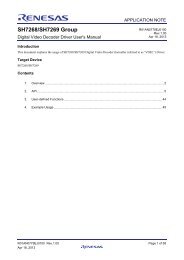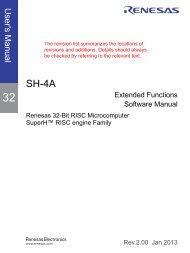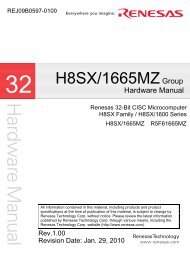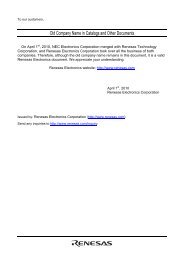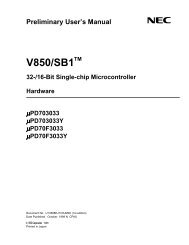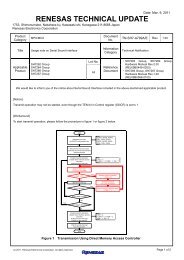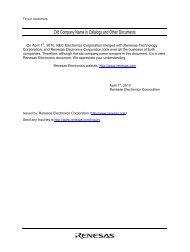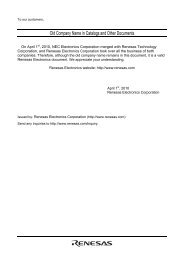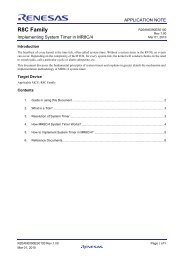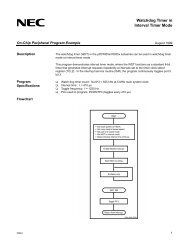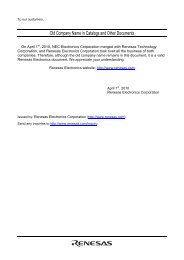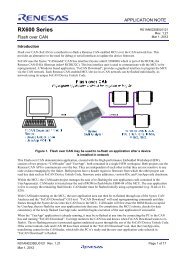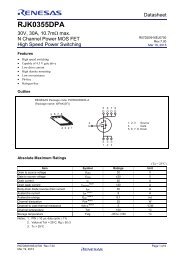RX63N Group Ogg Vorbis Decoder Sample Application - Renesas
RX63N Group Ogg Vorbis Decoder Sample Application - Renesas
RX63N Group Ogg Vorbis Decoder Sample Application - Renesas
Create successful ePaper yourself
Turn your PDF publications into a flip-book with our unique Google optimized e-Paper software.
General Precautions in the Handling of MPU/MCU Products<br />
The following usage notes are applicable to all MPU/MCU products from <strong>Renesas</strong>. For detailed usage notes on the<br />
products covered by this manual, refer to the relevant sections of the manual. If the descriptions under General<br />
Precautions in the Handling of MPU/MCU Products and in the body of the manual differ from each other, the<br />
description in the body of the manual takes precedence.<br />
1. Handling of Unused Pins<br />
Handle unused pins in accord with the directions given under Handling of Unused Pins in the manual.<br />
⎯ The input pins of CMOS products are generally in the high-impedance state. In operation with an<br />
unused pin in the open-circuit state, extra electromagnetic noise is induced in the vicinity of LSI, an<br />
associated shoot-through current flows internally, and malfunctions occur due to the false<br />
recognition of the pin state as an input signal become possible. Unused pins should be handled as<br />
described under Handling of Unused Pins in the manual.<br />
2. Processing at Power-on<br />
The state of the product is undefined at the moment when power is supplied.<br />
⎯ The states of internal circuits in the LSI are indeterminate and the states of register settings and<br />
pins are undefined at the moment when power is supplied.<br />
In a finished product where the reset signal is applied to the external reset pin, the states of pins<br />
are not guaranteed from the moment when power is supplied until the reset process is completed.<br />
In a similar way, the states of pins in a product that is reset by an on-chip power-on reset function<br />
are not guaranteed from the moment when power is supplied until the power reaches the level at<br />
which resetting has been specified.<br />
3. Prohibition of Access to Reserved Addresses<br />
Access to reserved addresses is prohibited.<br />
⎯ The reserved addresses are provided for the possible future expansion of functions. Do not access<br />
these addresses; the correct operation of LSI is not guaranteed if they are accessed.<br />
4. Clock Signals<br />
After applying a reset, only release the reset line after the operating clock signal has become stable.<br />
When switching the clock signal during program execution, wait until the target clock signal has<br />
stabilized.<br />
⎯ When the clock signal is generated with an external resonator (or from an external oscillator)<br />
during a reset, ensure that the reset line is only released after full stabilization of the clock signal.<br />
Moreover, when switching to a clock signal produced with an external resonator (or by an external<br />
oscillator) while program execution is in progress, wait until the target clock signal is stable.<br />
5. Differences between Products<br />
Before changing from one product to another, i.e. to one with a different type number, confirm that the<br />
change will not lead to problems.<br />
⎯ The characteristics of MPU/MCU in the same group but having different type numbers may differ<br />
because of the differences in internal memory capacity and layout pattern. When changing to<br />
products of different type numbers, implement a system-evaluation test for each of the products.



